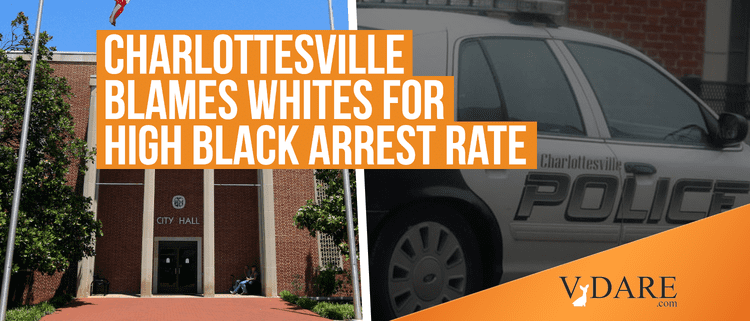
By Paul Kersey
02/20/2020
Let’s call this the “Time to Make it Illegal to Arrest Black Males” Charlottesville Edition…
Disproportionate Minority Contact Report finds racial disproportionality across all points in the local adult criminal justice system: The report was presented to Charlottesville City Council and produced recommendations on how to combat racial disproportionality and disparity in the local justice system, Cavalier Daily, February 19, 2020]:
The City of Charlottesville and the County of Albemarle have completed the first phase of the Disproportionate Minority Study — a multi-disciplinary project that examined how minorities are treated within the criminal justice system — to find that black individuals are overrepresented at every point in the local criminal justice system.
Using data from 2014 to 2016, the 14-member Adult Disproportionate Minority Contact Research and Planning Committee worked with MGT Consulting, a Florida-based public sector consulting firm, to determine the extent of racial disproportionality and disparity in the local adult criminal justice system.
The City of Charlottesville defines racial disproportionality as one race being over- or under-represented compared to the overall racial makeup of the whole community. Racial disparity is when individuals in similar situations receive different outcomes based on race.
The study is unique in its examination of racial disparity in the criminal justice system. While there have been studies on disproportionality, very few studies of racial disparity in local justice systems have been conducted.
During the period of 2014 to 2016, 51.5 percent of those arrested in Charlottesville were black men, where black men comprise only 8.5 percent of the City’s population. In Albemarle County — a region where black men make up 4.4 percent of the population — the demographic comprised 37.6 percent of arrests.
Racial disparity was also found across five areas of contact between individuals and law enforcement. African American men were found to be more likely to have serious charges leveled against them and experience a higher number of companion charges. They had longer bail and bond release decisions, experienced a longer length of time awaiting trial and experienced more guilty outcomes at trial.
Racial disparity for black men was not found at two critical points — the duration of time served for an offense and the duration of sentence imposed.
Recommendations from the committee
The nine recommendations the Disproportionate Minority Study produced to combat racial disparity and disproportionality in the local criminal justice system include to increase and support meaningful reentry programs, increase transparency of the City and County police departments and develop, encourage and support special initiative programs.
The Committee also recommends an increase in diversity in law enforcement, the adoption of programs that are alternatives to incarceration and to provide additional training opportunities for law enforcement and other actors in the criminal justice system. Finally, it was recommended that the City and County review the best practices from other communities and increase the access to data at each decision point in the criminal justice map.
The study also recommended that additional research be conducted to build upon the findings and recommendations of the report.
“We appreciate the work of the team in analyzing this dataset and presenting recommendations to address the findings,” said Siri Russell, director of Albemarle’s Office of Equity and Inclusion. “That so many of the recommendations capture efforts already underway in the City and the County speaks to our renewed commitment to equitable outcomes for our community.”
The City of Charlottesville and the County of Albemarle have already undertaken strategies that address several of the recommendations made in the report. Albemarle and Charlottesville now routinely release their data to the community — such as arrest data by race — instead of waiting for requests.
The formation of a Civilian Police Review Board, a body of community representatives tasked with investigating complaints concerning police misconduct, is among the study’s recommendations.
In Charlottesville, an initial Civilian Review Board was created in 2018 and formally established in November 2019, and the City has begun interviewing candidates for a permanent board.
The only explanation for why more black males are arrested, though they make up such a small percentage of the population of Charlottesville, is obviously white racism and structural inequalities, right? It couldn’t be because they commit more crime, and thus qualify for immediate imprisonment courtesy of the taxpayer?
Poor future-time orientation and low impulse control have no place in this conversation, when white people and implicit bias within the police force can immediately be blamed for why so many black people have unfortunate interactions with the criminal justice system.
Of course, we could just blame the statues of Confederate generals or Thomas Jefferson still littering Charlottesville as being the reason why blacks disproportionately get arrested…
We move one step closer to when the state (led by masochistic white liberals) deems it illegal to arrest blacks, even for the most heinous, violent crimes.
This is a content archive of VDARE.com, which Letitia James forced off of the Internet using lawfare.